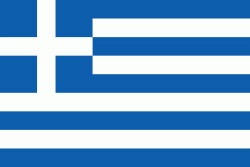Nea Anchialos National Airport (Nea Anchialos National Airport)
Nea Anchialos National Airport is an airport located near the town of Nea Anchialos in Greece. It serves the department of Magnesia and is also known as Central Greece Airport.
The airport is at an elevation of 83 ft above mean sea level. It has one runway designated 08/26 with an asphalt surface measuring 2759 x. It is designed to be upgraded over the ensuing years in order to accommodate the increase in air travel and its upgrades are planned in a six-phase framework. It currently has one terminal.
The airport is developed by public partnership and began operation in February 1991. It is the only civilian airport that serves the cities of Volos, Almyros, Lamia, Larisa, Farsala, Kalampaka, Trikala, and Karditsa. The airport is located between the towns of Nea Anchialos, Almyros, Velestino and Farsala, about 6 km northeast of Almyros town center, 15 km southwest of New Anchialos and 24 km southwest of Volos city center, in the Magnesia regional unit, in Thessaly.
The airport is at an elevation of 83 ft above mean sea level. It has one runway designated 08/26 with an asphalt surface measuring 2759 x. It is designed to be upgraded over the ensuing years in order to accommodate the increase in air travel and its upgrades are planned in a six-phase framework. It currently has one terminal.
The airport is developed by public partnership and began operation in February 1991. It is the only civilian airport that serves the cities of Volos, Almyros, Lamia, Larisa, Farsala, Kalampaka, Trikala, and Karditsa. The airport is located between the towns of Nea Anchialos, Almyros, Velestino and Farsala, about 6 km northeast of Almyros town center, 15 km southwest of New Anchialos and 24 km southwest of Volos city center, in the Magnesia regional unit, in Thessaly.
| IATA Code | VOL | ICAO Code | LGBL | FAA Code | |
|---|---|---|---|---|---|
| Telephone | Fax | ||||
| Home page |
Map - Nea Anchialos National Airport (Nea Anchialos National Airport)
Map
Country - Greece
 |
 |
| Flag of Greece | |
Greece is considered the cradle of Western civilization, being the birthplace of democracy, Western philosophy, Western literature, historiography, political science, major scientific and mathematical principles, theatre and the Olympic Games. From the eighth century BC, the Greeks were organised into various independent city-states, known as poleis (singular polis), which spanned the Mediterranean and the Black Sea. Philip II of Macedon united most of present-day Greece in the fourth century BC, with his son Alexander the Great rapidly conquering much of the ancient world, from the eastern Mediterranean to the North Western parts of India. The subsequent Hellenistic period saw the height of Greek culture and influence in antiquity. Greece was annexed by Rome in the second century BC, becoming an integral part of the Roman Empire and its continuation, the Byzantine Empire, which was culturally and linguistically predominantly Greek.
Currency / Language
| ISO | Currency | Symbol | Significant figures |
|---|---|---|---|
| EUR | Euro | € | 2 |
| ISO | Language |
|---|---|
| EN | English language |
| FR | French language |
| EL | Greek language |















